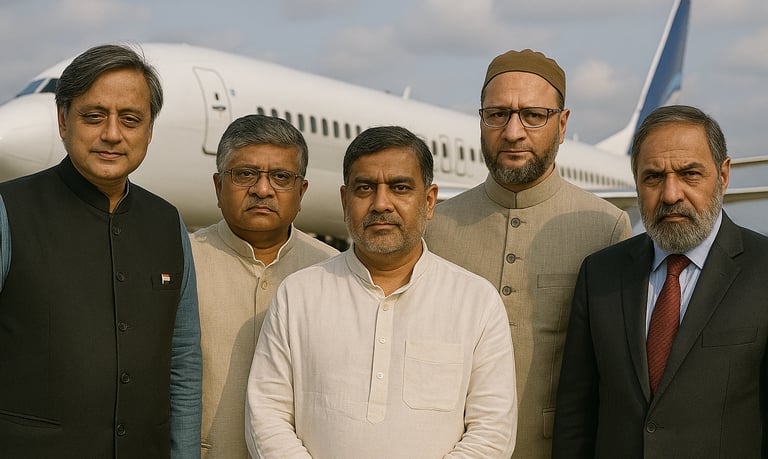Government Forms All-Party Delegations to Promote India's 'Operation Sindoor' Message on Global Platforms
POLITICSCURRENT EVENTS


To effectively communicate the objectives and rationale behind Operation Sindoor, the Union Ministry of Parliamentary Affairs has organized seven all-party delegations, each led by a prominent Member of Parliament. These delegations are tasked with visiting key countries to present India’s perspective and seek international understanding and support.
New Delhi, May 17, 2025 — In a significant diplomatic move, the Indian government has constituted multiple all-party delegations to advocate for India's firm stance against cross-border terrorism following the execution of Operation Sindoor. This initiative aims to engage with international leaders and institutions, elucidating India's position and garnering global support.
Background of Operation Sindoor
Operation Sindoor was launched in response to the terrorist attack in Pahalgam, Jammu and Kashmir, on April 22, which resulted in the tragic loss of 26 civilian lives. The operation involved precise strikes on nine terror camps situated in Pakistan and Pakistan-Occupied Kashmir (PoK), targeting infrastructure linked to banned outfits such as Jaish-e-Mohammed, Lashkar-e-Taiba, and Hizbul Mujahideen. The Indian government characterized the operation as "measured, non-escalatory, proportionate, and responsible," aimed at deterring further cross-border terrorism .
Formation of All-Party Delegations
To effectively communicate the objectives and rationale behind Operation Sindoor, the Union Ministry of Parliamentary Affairs has organized seven all-party delegations. These delegations are tasked with visiting key countries to present India's perspective and seek international understanding and support.
Delegation Details
Group 1: Destinations include Spain, Greece, Slovenia, Latvia, and Russia. Notable members include Dakshina Kannada MP Capt Brijesh Chowta, a former Army officer, who expressed gratitude for the opportunity to represent India on the global stage .
Group 2: Focused on Southeast Asia, this group will visit Indonesia, Malaysia, South Korea, Japan, and Singapore. The delegation comprises MPs from various political parties, including BJP's Dr. Hemang Joshi, JDU's Sanjay Kumar Jha, Trinamool's Yusuf Pathan, CPI(M)'s Dr. John Brittas, BJP MPs Aparajita Sarangi, Brij Lal, Pradhan Baruah, and Congress leader Salman Khurshid. Over a 17-day tour, they will engage with policymakers and think tanks to emphasize India's zero-tolerance policy towards terrorism .
Group 3: This delegation includes MPs Asaduddin Owaisi and Nishikant Dubey, who, despite their political differences, are united in conveying India's message against terrorism. Owaisi has suggested launching a global campaign against The Resistance Front (TRF), a terror outfit akin to Lashkar-e-Taiba, and seeking its designation as a terrorist organization by the USA .
Political Reactions and Support
The formation of these delegations has received widespread support across the political spectrum. The Congress party extended "full support" to the armed forces and decided to halt all planned party programmes, including "Samvidhan Bachao" rallies, as a mark of solidarity with the armed forces during this critical hour .
Prime Minister Narendra Modi emphasized the need for national unity during an all-party meeting, urging opposition leaders to stand united in support of the government's actions against terrorism .
Objectives of the Global Outreach
The primary objectives of these international engagements are:
Diplomatic Engagement: To brief foreign governments and international bodies about the rationale behind Operation Sindoor and its objectives.
Public Diplomacy: To engage with global audiences, including think tanks, media, and civil society organizations, to explain India's position and seek their understanding and support.
Counter-Terrorism Advocacy: To highlight the threat posed by cross-border terrorism emanating from Pakistan and to advocate for international cooperation in combating such threats.
Conclusion
The government's initiative to send all-party delegations underscores India's commitment to addressing the menace of cross-border terrorism through a unified and diplomatic approach. By engaging with the international community, India aims to garner support for its stance and work towards a collective effort in combating terrorism globally.
Source: PIB (https://www.pib.gov.in/PressReleasePage.aspx?PRID=2129254)
